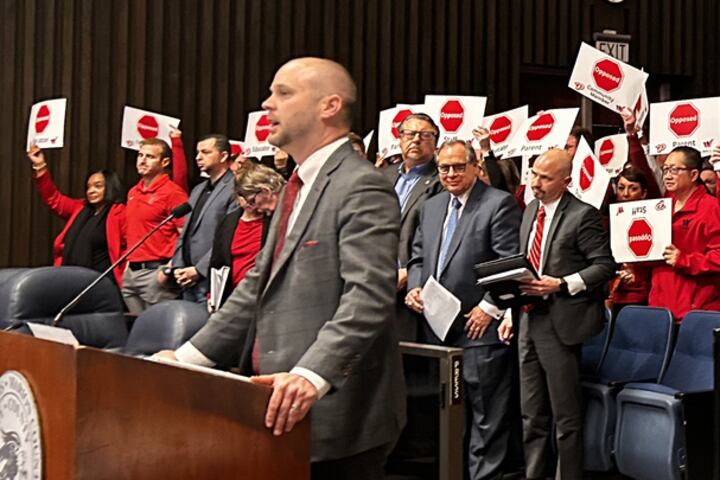Sign up for Chalkbeat Indiana’s free daily newsletter to keep up with Indianapolis Public Schools, Marion County’s township districts, and statewide education news.
This article was originally published by WFYI.
After months of controversy, an all-girls charter school is one step closer to opening in Washington Township. During a meeting Wednesday, the Indianapolis Metropolitan Development Commission approved the request to rezone a former church property for the Girls In STEM Academy.
But the path for final approval to open a school at that location is uncertain.
Opposition to the school appears to be growing. Officials and parents from the Metropolitan School District of Washington Township fiercely oppose the school. Twelve of the 25 Indianapolis City-County Council members now say they do not want the school to open at the proposed Michigan Road location.
The site is in the boundaries of Washington Township schools — and a few miles from other school districts, including Pike Township and Indianapolis Public Schools.
The council is the ultimate decision-maker in the rezoning process. The council typically votes to approve all requests at one time in a consent agenda. But the councilor of District 6, where the building is located, can call for an additional public hearing before a final council vote.
People opposed and in support of the charter school packed the chamber for the public hearing Wednesday afternoon. Those from Washington Township wore red in contrast to the purple shirts advocating for the Girls In STEM School.
The school, operated by Paramount Schools of Excellence, is projecting an enrollment of 125 students in grades K-6 in the first year. The projection increased to nearly 300 students in grades K-8 by 2028-29. Enrollment for the school is open but Paramount is planning to use a temporary location for the 2024-25 school year because the planned campus won’t be ready.
Paramount says they aim to close the gender and racial gaps in science, technology, engineering and mathematics achievement while preparing the students for high school, college, and careers in STEM fields, according to the planned curriculum.
But Councilor Dan Boots (D-District 3) said the school will only benefit the organizers behind it — Paramount and its partners Purdue Polytechnic High Schools and the Girl Scouts of Central Indiana.
“For this community and the people that live in that area it does not serve them because they do not feel they need it. Washington Township, Pike Township are excellent school townships,” Boots said. “If a Black or brown young lady wants a STEM education they can get it. It’s there.”
Girls In STEM Principal Chrystal Westerhaus pointed out that test scores at Washington Township are far lower for economically disadvantaged and Black students compared to their white classmates. Scores for similar students are higher at the local schools operated by Paramount.
“Our new school helps address this problem at the source,” Westerhaus said. “It allows them to thrive and excel in a proven supportive environment that provides a sense of belonging and purpose.”
Councilor Leroy Robinson (D-District 1) asked the commission to approve the rezoning and give Black and brown girls a chance to attend the school.

Jonathan Hughes, an attorney for Washington Township Schools, made several arguments for the commission to deny the rezoning, including strong local opposition, concerns around traffic safety and that using the site for a school is not compliant with the Comprehensive Plan for the City-County.
The development commission’s staff and hearing officer previously recommended the rezoning request be approved if Paramount agreed to several site changes, including construction of a three-lane driveway and a traffic control plan for arrival and dismissal of students.
The commission members voted 5-1 to approve the request. The City-County Council could take up the request next month. The full council meets April 1.
Charter schools are public schools that are privately managed. They are granted a contract to operate by one of several authorizers in the state. Last year Trine University, a private institution in Angola, authorized Paramount to open Girls IN STEM.
A charter school is directly overseen by a board that is not elected by voters. Most state funding for charters comes from per-student tuition support.
Eric Weddle is the WFYI education editor. Contact Eric at eweddle@wfyi.org.






